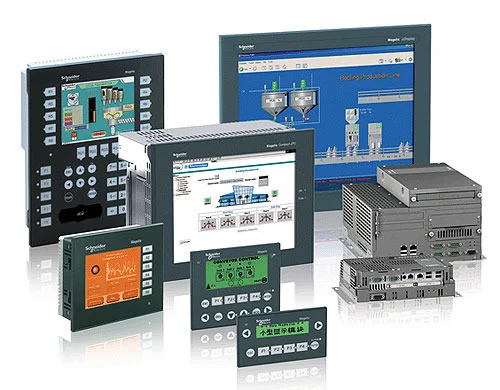
HMI vs. IPC: What’s the Difference?
Understanding the distinctions between Human-Machine Interfaces (HMIs) and Industrial PCs (IPCs) is essential when selecting a monitoring and control solution in industrial automation. While they may appear similar in design, these devices serve different purposes and come with unique advantages and limitations. Here's a detailed breakdown of how HMIs and IPCs compare.
What is an HMI?
An HMI (Human-Machine Interface) facilitates communication between an operator and a machine. Typically used in conjunction with PLCs (Programmable Logic Controllers), HMIs display data from the PLC and send operator commands back to the PLC using predefined communication protocols.
Key Characteristics of HMIs:
-
Purpose-built: HMIs are designed specifically for industrial control and monitoring tasks.
-
Vendor-specific compatibility: Most HMIs are built to integrate seamlessly with the PLCs of the same manufacturer, though third-party integration is possible with additional cost and configuration.
-
Historical evolution: HMIs evolved from batch interfaces to command-line interfaces, and now to graphical interfaces (GUIs) with visual representations of processes.
-
Closed systems: HMI software environments are typically locked, reducing the risk of malware but limiting custom software installation.
-
Ease of use and setup: HMIs offer simplified user interfaces, fast setup, and require less technical knowledge compared to IPCs.
-
Cost-effective: Generally more affordable than IPCs for basic applications.
-
Limitations: Lower processing power, memory capacity, and screen resolution. Advanced features like multi-touch, large databases, and complex visualizations are often lacking.
What is an IPC?
An IPC (Industrial PC) is a rugged computer designed to operate in harsh industrial environments. Unlike HMIs, IPCs can run multiple applications and operating systems, such as Windows or Linux, and often serve as both an HMI and a PLC.
Key Characteristics of IPCs:
-
High performance: Equipped with advanced processors and memory, IPCs can run complex software and handle large datasets.
-
Open systems: IPCs run open operating systems, allowing for the installation of third-party and custom software.
-
Flexibility: IPCs support multiple functions such as SCADA, HMI, database management, and even PLC emulation.
-
Versatility in connectivity: Typically include numerous I/O ports, communication interfaces, and support for various industrial protocols.
-
Advanced displays: Larger, high-resolution, multi-touch screens enhance user interaction and visualization.
-
Security concerns: Open systems are more vulnerable to malware and require frequent updates and IT oversight.
-
Higher cost: Due to their power, flexibility, and ruggedness, IPCs are significantly more expensive than HMIs.
Which Should You Choose?
-
Use an HMI if:
-
Your project is small to mid-sized
-
Budget and setup time are limited
-
You need basic visualization and control functions
-
You prioritize security and simplicity over versatility
-
-
Use an IPC if:
-
You require high computing power and flexibility
-
You're working on a large-scale or complex project
-
Your application involves advanced SCADA systems, databases, or multi-software integration
-
Long-term scalability and remote access are essential
-
Emerging Trends: Web-Based HMIs
A new generation of HMIs is emerging, utilizing web technologies like HTML5. These web-based HMIs can connect to servers and access data in real time, supporting remote monitoring and multi-device compatibility. This approach blends the simplicity of HMIs with the flexibility of IPCs.
Conclusion
Both HMIs and IPCs have essential roles in industrial automation. HMIs are ideal for straightforward monitoring and control tasks with enhanced security and ease of use. IPCs, on the other hand, offer powerful, scalable, and multifunctional solutions suitable for complex and data-intensive environments. The choice ultimately depends on your project's specific requirements, budget, and long-term objectives.
Contact PLG Automation
Email: sales@plgautomation.com
Phone: 800-906-9271
